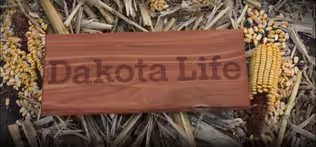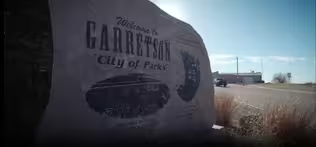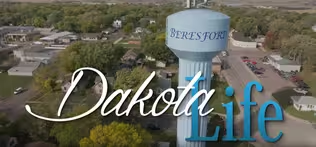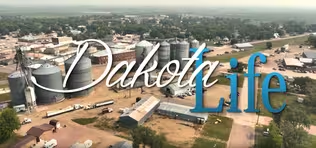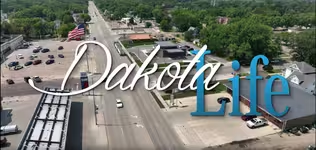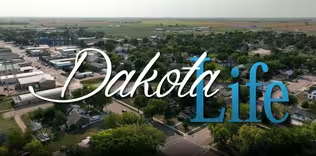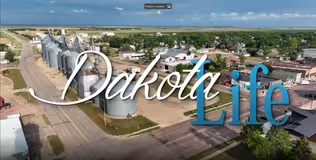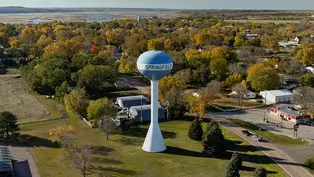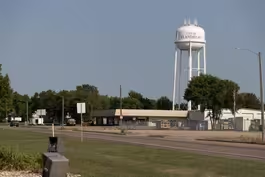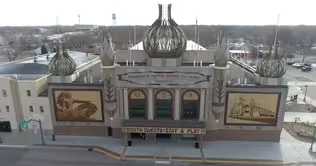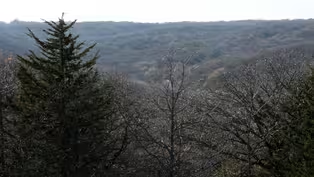Dakota Life
Greetings from Elk Point
Season 27 Episode 5 | 29m 46sVideo has Closed Captions
Greetings from Elk Point
We visit a home basketball game to see how the school is not just the hub of a small community. We meet a local antique dealer and learn about her adventures playing and coaching bridge at a world-class level. Darts are a classic bar game, but in Elk Point it is much more. We also visit a flower farm with a historic past and learn about local farmers that helped build this thriving community.
Problems playing video? | Closed Captioning Feedback
Problems playing video? | Closed Captioning Feedback
Dakota Life is a local public television program presented by SDPB
Support Dakota Life with a gift to the Friends of Public Broadcasting
Dakota Life
Greetings from Elk Point
Season 27 Episode 5 | 29m 46sVideo has Closed Captions
We visit a home basketball game to see how the school is not just the hub of a small community. We meet a local antique dealer and learn about her adventures playing and coaching bridge at a world-class level. Darts are a classic bar game, but in Elk Point it is much more. We also visit a flower farm with a historic past and learn about local farmers that helped build this thriving community.
Problems playing video? | Closed Captioning Feedback
How to Watch Dakota Life
Dakota Life is available to stream on pbs.org and the free PBS App, available on iPhone, Apple TV, Android TV, Android smartphones, Amazon Fire TV, Amazon Fire Tablet, Roku, Samsung Smart TV, and Vizio.
Providing Support for PBS.org
Learn Moreabout PBS online sponsorshipMore from This Collection
Dakota Life stories from towns in southeast South Dakota
Greetings from Wessington Springs
Video has Closed Captions
Most cities shape the landscape they’re on, but in Wessington Springs it’s the other way around. (29m 45s)
Video has Closed Captions
Discover the beauty and history of Palisades State Park, goat yoga, and a very special love story. (29m 46s)
Video has Closed Captions
Beresford hosts the Frostbite 4, a regional favorite winter road race. (26m 26s)
Video has Closed Captions
From a window to the past to raising the next generation, Dakota Life explores Wagner. (28m 53s)
Video has Closed Captions
Greetings from Madison, the center of Lake County. (28m 55s)
Greetings from the Corn Palace
Video has Closed Captions
Greetings from the Corn Palace plus stories from southeast South Dakota and Aberdeen. (26m 16s)
Video has Closed Captions
Dakota Life showcases Newton Hills and the SD State Park system. (28m 5s)
Providing Support for PBS.org
Learn Moreabout PBS online sponsorshipThis is a production of SDPB.
There's not a lot of people in this town that I don't know that I wouldn't consider friends or family.
you know, that everybody's got your back.
There's a lot of great things about Elk Point.
It's big and small at the same time.
It's not too big that you don't know everybody, Greetings from Elk Point.
Greetings from Elk Point- Jefferson School District.
Greetings from Elk Point, South Dakota.
Greetings from Elk Point Jefferson High School.
I appreciate it!
Haha!
Greetings, everyone from Elk Point, South Dakota.
Greetings, from the Fleurish Flower Farm in Elk Point, South Dakota.
Greetings from Elk Point, South Dakota.
Greetings from Elk Point South Dakota.
A great place to live.
Dakota Life.
Greetings from Elk Point is supported with your membership.
Thank you.
With help from First Dakota National Bank, First Dakota has supported the dreams of families, businesses and communities for over 150 years with personal, business and banking solutions for every stage of the journey.
And by Thermo Bond buildings in Elk Point, customizing equipment, shelters and mission critical buildings since 1987, serving customers around the country with building solutions that are strong, integrated and customized.
Donors to the Explore South Dakota Fund.
Support the production of local documentaries and other programs of local interest.
Presented by SDPB brands of SDPB.
Appreciates their support of this program.
Hey, everybody.
My name is Tim Davison with South Dakota Public Broadcasting.
I'm here in the beautiful town of Elk Point.
I've found that there is no better way to get to know the vibe of a small town than at a good old fashioned high school basketball game.
Here at Point Jefferson, we're about to go meet the Huskies.
Come on.
The school is the center of pretty much everything that happens in a small town.
And for us to be able to have the community come in here multiple times a week for fine arts activities, for community activities, for sporting activities.
It just is a is a great way for the community to continue to bond and grow together.
But yeah, it's just a it's a great community really rallies around and sports culture here.
It's You know, small town, South Dakota.
Now, you play every sport.
It's kind of just the, the sports culture, to be involved with the community to, have that community support is always great as a young student athlete.
My dad is from Elk Point, so there's this long family ties to the community.
my dad, Todd Larsen, the field is actually named after him.
He's taken care of the field since I think the early 80s, when he moved back after college.
He played college baseball at Black Hills State in Spearfish.
He's always had a passion for the, the game of baseball.
And, he's poured his, you know, his lifelong, efforts and energy and, maintaining that field and making it one of the best in South Dakota.
Todd still takes care of his field But a few seasons back John Gale was on deck to take over as head coach And in 2024, he led the Huskies to their First state championship in 68 years.
We have moved here as a family in July of 2022.
Our first year here we are in the state tournament in every sport but one.
When you start seeing that success that really bleeds into academics and, National Honor Society, student Council and, you just see everyone so prideful in what we do, and there's a vested interest in everyone.
It's amazing to see the support for everything that is husky.
So we are a school that came together that consolidated.
It's been 30 years ago, I believe.
Now.
so we have multiple trophy cases in the school.
We have trophies for Elk Point, Jefferson.
We have, our Elk Point trophies.
And then in the, community center in Jefferson, they have the trophies from the Jefferson community when they were in school.
So, yeah, we take great pride in the trophies that we've added in the last couple of years.
And all the way, all the way back, it's been a wonderful experience to just, be a part of some of these successful teams and watching these kids grow and develop, high school activities teach you how to win and how to lose.
And some of the hardest lessons that people learn are lessons in losing.
And so to be able to have the success, the highs that you feel for the, the wins and then also figure out what you need to do better when you lose, those lessons go much farther than anything we can teach out of a book.
[Laughter] Behind Camera - "Perfect."
It's pure, unadulterated thought and effort.
It's one of the few sports where the team wants it the most will win the game.
A bridge can be traced back to the 16th century.
Card players from all over the world have been shuffling up their cards and dealing them across kitchen tables.
That includes the Barretts, Karen and Jade.
Some people learn by playing.
I mean, I didn't have the same arc, but even I learned to play because that's what you did in my house right the moment that my parents had three kids.
That was for for bridge, for dad.
So yeah, aces or fours.
Yeah.
I mean, the mom says, that's my first sentence and I don't doubt it.
I learned to play bridge as a teenager.
My senior year of high school.
I was the nerdy kid along with a guy from my Spanish class, and we played bridge with the teachers on our lunch hour.
Then I went to college, and my college degree plans went right down the tubes.
When in the very first quarter, I discovered that the student union had bridge all day, every day.
Eventually, Karen outgrew her college game at the student union at UC Berkeley.
It wasn't enough of a challenge, so I went over and started playing bridge for money in San Francisco.
That wasn't a big enough venue, so I went down to Southern California and played bridge for money out of LA.
And that's when I went to my first world championship in 1972.
After that world championship, Karen decided to take a little break.
But the cards in calling once again.
Well, now.
Now I was the new kid.
I said, no, don't do that.
You know, I've been doing this for 15 years.
I'm not the new kid.
And a few years later, I won my first national title.
Karen isn't the only skilled card shark in the Barron household.
Jade has played with and coached over 350 champions, including some of the most prominent athletes in the world.
Chuck Dobson, who doesn't like to go by Chuck because he had issues when he was jockey's Charles Dobson and now he plays out of Overland Park.
Great pitcher, you know, Vida Blue.
Said he should be in the Hall of Fame, not him.
Sherrill Headrick came and played bridge.
Lefty Curran, Lefty met me a few years ago, and now I'm a big hockey fan.
You know, I grew up around Lake Placid.
So, you know.
So he says, hey, I hear you're pretty good.
My name is.
And I said, Lefty Curran, I know who you are.
So whether you're a former Olympic athlete or just trying to win the next point at the family card table, here's a little advice from this former world champion on the game.
Some people play for a social event, and that's okay.
Bridge can be whatever people want it to be.
You can sit at the kitchen table, drink too much, laugh, throw the cards, and that's fine.
However, however it works for you.
Elk point is a place that's been shaped by its businesses, but also by its river.
This is the landscape of Elk Point.
The rivers on either side of Elk Point have moved both people and industry over the years, but also, themselves since Elk Point was founded.
The Missouri has moved two miles south to where it is today.
The earliest Europeans in the area were fur traders at an outpost for the Hudson's Bay Company.
The traders collected furs from all of the northern Rockies and sent their wares down the Missouri and to a post at what is now Elk Point.
Later, Lewis and Clark traveled upriver, and they noted an interesting geologic feature in the area that would later be called the Ionia Volcano.
Clark described it as a huge bluff that was too hot to touch, and was constantly smoking with a sulfuric smell.
A blue clay bluff of 180 or 190 feet high on the L.S.
Those bluffs appear to have been literally on fire and at this time, are too hot for a man to bare his hand in the earth at any depth.
William Clark 24th of August, 1804 Host: This feature was not a real volcano.
The heat was actually from a chemical reaction involving iron pyrite deposits.
But we're never going to know for sure, because the Ionia volcano was claimed by the mighty Missouri in the Great flood of 1878.
Yet another example of the river shaping this region.
Before leaving the area, the expedition held the first election west of the Mississippi, electing Sergeant Patrick Gass to replace Sergeant Charles Floyd, who died near present day Sioux City.
Clark also wrote in his journal about a great deal of elk sign in the area.
Some 55 years later, the town of Elk Point was founded.
In the 1860s.
The river would bring plenty of pioneers to Union County, but coming to call Elk Point home wasn't easy.
For one farmer.
The journey started 15 years earlier during the Irish potato famine.
my great great grandfather came here from Ireland in 1861 and homesteaded The soils here in Union County are very fertile.
all the soil here around Elk Point is alluvial soil, means it's been washed down from someplace else.
Our soils run deep.
We don't have bedrock.
We don't have rocks.
when the Currys came here, I'm sure they wrote letters to different people in Ireland, told them how good it was and everything else.
So it was an enclave of Irish all around where my great great grandparents settled the Connollys, the Donnellys and the Currys.
Our families, farmed here for the last hundred and 60 plus years.
to be successful is basically how you handle the failures along the way.
and we all have failures.
They had grasshopper scourges We've had floods.
There's all sorts of discouragements that happen.
But if you it's in your blood to farm, and that's what you really want to do.
Then you do it, and you learn how to deal with the trials and tribulations that happen.
My great grandfather, my grandfather, my father and I, and now my son's farming with us also.
Curry Seed was started by my grandfather in 1935.
We're in the height of the depression, and he's trying to determine what he can do so that the farm continue to make money.
He went to a short course in Iowa State and at that short course, they talked about raising hybrid seed corn.
that was a new thing that was just coming out.
a farmer from each township was going to raise the seed corn for the other farmers of the township, and he felt that he could be the one that would raise seed corn.
that's when we started J.J. Curry and Sons, which eventually became Curry Seed Company.
Truly, farming is in your DNA.
It is something that you believe in.
I personally knew I wanted a farm from the time I was 5 or 6 years old, and it's just part of who I am.
But, my son took a little longer.
The Currys were among many families that came to call Union County home to keep up with the growing population.
The subsequent building boom required a whole lot of lumber.
A big business also powered by the river.
Preston Hotchkiss and his partner, Whitcomb, built the first sawmill in a cottonwood grove about one mile west of Elk Point in 1862.
At that time there was much timber along the Missouri; the belt averaged two miles in width.
there was oak, ash, elm, and hackberry... but most of the lumber was from second-growth cottonwood Between 1866 and 1870, several sawmills were set up along the Missouri.
A History of Union County, South Dakota to 1880 By Edward Elliott Collins The lumber helped build homes in and out of town.
In Elk Point, some beautiful examples of Victorian era architecture are still standing today.
Every home, a history unto itself.
Including this one built by First Lieutenant Michael Hoffman, who settled in Elk Point after escaping a Confederate P.O.W.
camp In 1864.
The river was also the engine behind another building supply business.
They got fired up in the late 1880s.
Outside this historic residence.
Charles Murtha, a local businessman, made a beehive brick kiln that you can see the remnants of right behind me.
He would ship clay mud up from the south via barge on the river and make bricks that were used in construction projects all around southeast South Dakota.
Elk point was shaped by the unique riparian landscape it sits on, as well as the businesses that helped build it.
One of those businesses today is Flannery's Pub in the heart of downtown.
With cold drinks and warm atmosphere they bring the community together they also host dart tournaments by the Elk Point Pink Ladies Yes, we're a dart league, the Pink Ladies Dart League.
But it's not just about the darts.
I mean, even though we're having fun throwing darts, the most important thing is that we're donating to those in need.
All of our money goes back towards our recipients.
So somebody in the community finds out that a friend or family has cancer.
We reach out to those people, and if they're willing to accept a donation, we give them a donation.
It might be called a "Pink Ladies" Tournment but everyone's invited to play.
You don't even have to be good.
our team is like the lowest.
Are we the last?
We're almost the last team.
But it's not about being good.
It's about having a good time.
I, for one, do like to have a good time.
so sign me up!
I'm ready..." Are you gonna play?!
I'm gonna play.
Alright!
We usually have about an hour or two hours where people can get signed up, and then we take at least an hour break in between that time so that we can get all of our brackets set up and make sure we know how much money we've taken in.
And then we usually do, blind draw doubles tournament, which means you're probably going to have a better player and maybe a player that doesn't throw as well.
Paired up together.
Paired with long-time thrower Brian Jennings, I was definitely the player who didn't throw as well.
This last time we had 28 teams, So 56 people, we usually do have, like, a $20, a piece.
Sometimes we might say if you're wearing a costume or you're wearing tank, you get a cheaper, So then we just throw darts in a bracket format, double elimination, and it usually takes us somewhere around 6 or 7 hours.
Say, I got out of here like two hours.
I played in the championship match against my husband.
So we were here till the very end.
I got into the pink ladies.
I have seen some other groups of women start Pink Lady leagues.
So when we went to our state tournament I asked them what it entails, what you needed to do to have one, and we had a meeting, and there's eight of us there, and we decided today's the day were we'll become the Pink Ladies today.
And we started the group and it's been a heck of a ride since.
since 2019, we've donated to over 50 recipients, I think 50 or 51 recipients.
And I think we're somewhere around $60,000.
I felt the community needed a. group of people that could be there to donate to people, in need.
There wasn't anything in town like that.
And my nephew, who had brain cancer prior and at the time they could have used the help.
So, we love darts and we love the group of girls that we do all the fundraising and darts with.
So we just decided, why not do it?
As much money as we've raised and also how much we have donated I don't think that we realized we'd be where we are today.
if you want something that helps you feel like you're giving back to the community, something that gives you a little bit more purpose, you know, your why for why you do things.
I think it's a great thing to get involved with.
There's not a lot of these opportunities in small towns.
it's been a really, valuable thing for those of us that are involved.
This, is Sigrid Petersen.
When she married John Kalstad, they received the family farm as a gift.
But just four years into their marraige, John died of a brain aneurysm.
Leaving Sigrid to care for the farm, and their two-year-old daughter, Thelma.
When Thelma's daughter, Mary Elizabeth Fell in love with her husband, Vernon They moved their young family to Oregon.
when Clarinda was just a child.
Hi, my name is Clarinda Hanson.
White, and I am a granddaughter of Thelma Kalstad.
She was quite a woman.
All Norwegian, about 4'10"... 4'11".
A very strong, independent woman who had a heart of gold.
Vernon and Mary Elizabeth Brought Thelma's eight grandchildren across country to visit the farm as much as possible.
This is where we came in the summer, and we played, and we got to know my grandma better.
And we learned about our history here on this farm.
Part of that history, includes another bunch of Hansons No relation to Clarinda, but rather neighbors who helped Thelma farm the land.
And so my great-grandpa, and my grandpa, and my dad And then falling down to my brother now, have taken care of the land, ever since Thelma was there.
My grandpa would go there in the mornings and at night when she got older, to haul in water for her.
we had to haul it from the barn.
when everybody was getting baths, rooms and running water, she decided not to do that.
And so we came here, we had an outhouse in the in the back.
Or, if you're lucky, you had a bedpan under the bed, and we we loved it.
It was like we didn't miss all of the fancy stuff that you might have in your own home, like a, you know, like a toilet and a shower.
We learned to do without it.
And then we got to appreciate that.
I thought of it as a little house in the prairie.
In this house in the prairie, Thelma spent a whole lot of time cooking.
I always remember, she had smells.
from her kitchen.
There was smells coming.
She was always baking, she was always canning.
She had this little room off her kitchen where she would do her canning.
I remember the rows, and rows, and rows of jars.
and right outside the door was the cellar down into the ground.
where she would store them.
just a few steps out of the kitchen, there was a summer kitchen, which back in the day, when there were a lot of farmhands, she would they would cook all their meals out there because it was hot and sticky and humid.
And so they would keep the heat in the summer kitchen.
So when the men came in and ate at the kitchen table, the house won't have been heated up.
The summer kitchen and the farm, were sold in 2013.
The Kalstad farm is now the Heckathorn Farm A family that's been farming nearby for decades.
Today, they grow seed corn and a whole lotta flowers.
When it sold to the Heckathorns, And they went to take the house down, ah, we went over there, I remember having to empty out the cellar down there.
all the canned food from the cellar.
We didn't dare eat it, cause who knows how long it had been down there.
since she passed in '99 I believe.
it does my heart good to walk around and see the flowers, because my grandmother loved flowers.
the land is still being used in the way that it was intended.
It's it's a farm.
The Heckathorns are a family that respect the land.
And what my grandmother saw for the future of this property.
Now that we know about the past on this piece of ground, Let's learn what eventually grew out of it.
I'm Christy Heckathorn.
I am the owner of Fleurish Flower Farm.
We do you pick events here in the summer, and I'm also a wedding florist, and I grow pumpkins.
I have been in the floral industry pretty much since I got out of college.
worked as a florist, worked for a flower shop in Elk Point, actually, for Pioneer Drug and Flower, which was really well known in the Elk Point area, was also home to Edgars, the soda fountain.
People came from all over to do that.
So I worked for Barb Wurtz for about five years, and she's also kind of a famous Elk Point person.
And I learned how to do flowers from her.
And she was amazing.
when she got out of the floral business, I started doing weddings, and I did that.
And then about four ish years ago, I decided to start the flower farm people get really excited about flowers.
They love them.
there aren't a whole lot of places where people can show up and buy a container and someone says, go out and pick as many flowers as you want.
they can spend hours out there picking flowers, arranging, one of my favorite parts of the you pick events is to be able to just walk through, and see people at the tables, either like eating something or bringing their flowers, chatting with their grandma.
You know, the some of the little kids are on blankets on the ground having, like, a little picnic.
And I absolutely love that.
Like, that is so life giving and inspiring to me when I see that, it makes all of the long hours of weeding and all of the non glamorous things that happen with the flower farm, and there's a lot of those moments that most people don't see.
But when it comes Sunday night or whenever we have an event here, it's kind of like the best of everything shines.
And that's the part that I love.
the food trucks are local, the musicians are local, and I feel like it just gives a local flair to it.
I have the best, best group of people that helped me at the farm.
Literally the best group of people.
flowers are really cool, but what I think is actually even cooler than the flowers is the history of the farm.
And we knew a little bit about it when we bought the property But at the time I wasn't thinking that I would have a flower farm here.
We just bought it for my husband's seed business, there was an old farmhouse here on the property and the summer kitchen, which is behind me right here.
And we weren't able to save the farmhouse the roof was caving in.
but the summer kitchen, the vines are original, like they were growing on it.
Some of Thelma Kalstads, some of her flowers over around it, and I just thought it's too neat of a thing and the history of it, it needs to be preserved.
And then when I started the flower farm, I thought, how cool would it be to incorporate the two together if we can tie the history of the property with the flowers?
Because where the flowers are growing It was their cattle yard.
So, the fertilizer that it provided for my flowers has been great I think it just takes one generation of not telling the story and it can be forgotten.
I think there are details and parts of history that are just like, we'll never go back to that time.
It's a time that was here, but now it's gone.
And people don't use outhouses and they don't live without running water, and they don't use a summer kitchen to do their cooking and canning in, and they don't grow flowers and things like they used to either.
So all of it is just a story that, I think needs to be preserved.
And I think not just for the people of the Elk Point area, but I think people for the state of South Dakota.
I think it's important for them to be able to just come and see a little slice of that that is still here.
If you've missed any of our stories here in Elk Point, or just want to go back and take another look, see more, at sdpb.org/dakotalife For all of us at SDPB, Here in Union County I'm Tim Davison, Thank you for watching.
Support for PBS provided by:
Dakota Life is a local public television program presented by SDPB
Support Dakota Life with a gift to the Friends of Public Broadcasting
